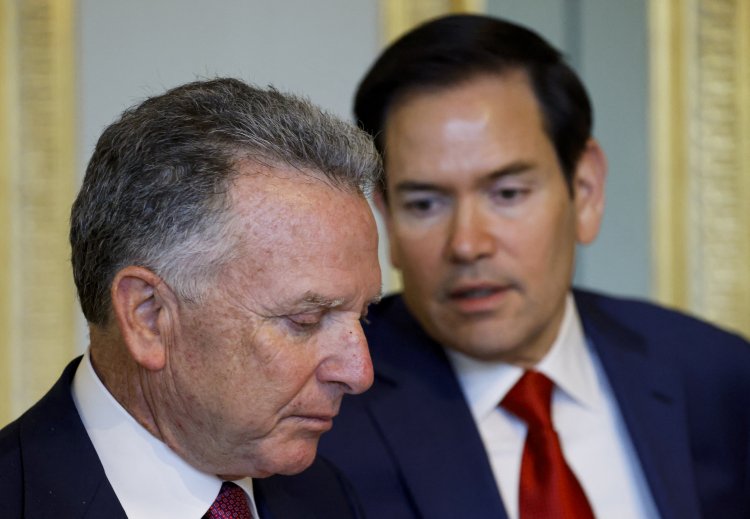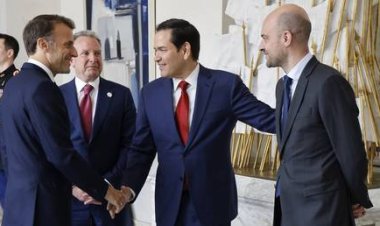White House considers removing sanctions on Russian energy assets, including "Nord Stream"
The article highlights the ongoing debate between Steve Witkoff and advocates of energy exports from the State Department and the U.S. government.

Removing the existing sanctions on one of Russia's primary pipelines that links its natural gas fields to Western Europe would signify a significant shift in U.S. policy that was first established during President Donald Trump’s administration. President Joe Biden initially waived these sanctions at the start of his term but reinstated them after Russian President Vladimir Putin's invasion of Ukraine in 2022.
Reopening Nord Stream 2 could offer substantial financial benefits to Moscow, provided the European Union agrees to resume purchasing gas through the pipeline—a scenario that seems unlikely amid the EU's efforts to reduce its reliance on Russian energy. Nevertheless, lifting the sanctions would serve as a diplomatic victory for Russia and a notable concession from Trump.
The White House special envoy, Steve Witkoff, is reportedly the primary advocate for lifting the sanctions, according to sources close to the discussions. Witkoff, who has claimed to have established a friendship with Putin during his tenure as Trump’s envoy to Moscow, has instructed his team to compile a comprehensive list of energy sanctions imposed by the United States on Russia.
However, in a joint statement issued by the White House, Secretary of State Marco Rubio and Witkoff refuted the notion that discussions about easing sanctions had occurred.
“This is false. Neither of us have had any conversations about lifting sanctions on Russia as part of a peace deal with Ukraine," their statement said. "This is just totally fictitious and irresponsible reporting from PMG, a fifth-rate publication. If they have an ounce of journalistic integrity they will fully retract this piece of fiction.”
Despite the September 2022 explosion that destroyed one line of the two Nord Stream 2 pipelines, one remains operable and can deliver gas to Germany. The cause of the blast, which halted gas shipments, is still under investigation, with reports suggesting possible involvement of Ukrainian nationals.
The Biden administration also imposed sanctions on Russia’s Arctic 2 liquefied natural gas project, which could produce as much as 13.2 million tons of gas annually if restrictions were lifted.
Trump has been critical of Nord Stream in both his presidency and his campaign, reprimanding Biden for initially waiving sanctions in 2021 before reinstating them later on.
Witkoff and Rubio were expected to participate in peace negotiations in London on Wednesday but withdrew at the last moment. The administration’s proposal included acknowledging Russia's illegal annexation of Crimea in 2014 and lifting sanctions—conditions that Ukraine has firmly rejected. The European Commission may propose a prohibition on member countries from signing new contracts with Russia for oil and gas.
A second individual indicated that while Witkoff has raised the possibility of lifting energy-related sanctions, the idea has not garnered significant support in the White House, with Rubio reportedly attempting to stifle it. “This is not a cake in the oven being baked, though the ingredients are being assembled,” this person commented.
Opposition to this idea reportedly includes Rubio and Interior Secretary Doug Burgum, who also chairs the White House Energy Dominance Council. Some U.S. government officials believe Witkoff may have been misled by Russia regarding the economic benefits of reinstating business relations.
“There is an internal White House debate between the energy dominance people—Burgum, who wants markets for U.S. LNG—and Witkoff, who wants to be closer to Russia,” one individual noted. “Russia regaining its status as Europe’s top energy supplier would be a bloodbath for American [oil and gas] producers.”
The State Department has not responded to inquiries, and the Interior Department did not reply to an email sent to Burgum.
Allowing Russia to resume gas shipments through Nord Stream 2 or Arctic 2 LNG would lower global gas prices and create direct competition for U.S. LNG exporters such as Cheniere Energy, stated Laurent Ruseckas, executive director of market analysis firm S&P Global Commodity Insights.
“If you bring Russian gas back into the market, that would reduce the appetite of potential buyers of U.S. LNG,” Ruseckas said in an interview.
The U.S. natural gas sector has made significant progress in Europe as countries like Germany have moved away from Russian energy supplies following the invasion of Ukraine. However, oil and gas companies are currently facing challenges due to the administration's trade policies and tariffs on imported steel. The White House’s often opaque trade policy has also led companies to scale back their investment plans.
Multiple external parties are lobbying the administration to lift the sanctions, two sources have reported. Among these is Stephen Lynch, a Miami-based head of global private investment firm Monte Valley Partners.
Lynch specializes in acquiring energy infrastructure assets previously associated with Russia. In 2007, he and his partners purchased portions of the Russian oil company Yukos at a significant discount, and they recently acquired the Switzerland branch of Russian financial firm SberBank. He is now seeking a license from the U.S. Treasury Department to proceed with buying the pipeline.
A representative from Monte Valley did not respond to requests for comment.
Matthias Warnig, a former spy and close associate of President Putin who is under U.S. sanctions, has also been pursuing efforts to restart the pipeline with support from U.S. investors. He has reached out to representatives from the Trump team through American business intermediaries, and his initiative is understood to be distinct from Lynch's consortium.
The Biden administration showed no interest in Lynch's pipeline acquisition efforts last year.
Anna Muller for TROIB News
Find more stories on Business, Economy and Finance in TROIB business












